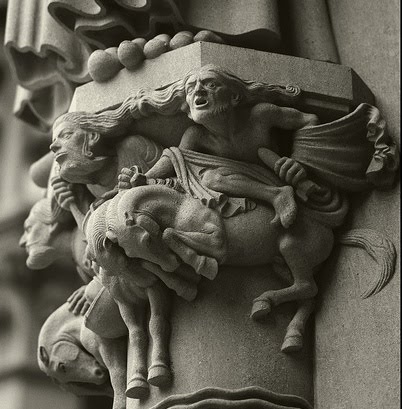“SHOEMAKER, stick to thy last!” …better do
one thing supremely well than many badly. That is the central theme of th(e)
(fifth) Tradition. Around it our Society gathers in unity. The very life of our
Fellowship requires the preservation of this principle.”
--Twelve
Steps and Twelve Traditions (153)
--Bill W., Problems Other than Alcohol
…the teaching and practice of the Twelve Steps, is the sole purpose of
an AA group. Groups have repeatedly tried other activities and they have always
failed. It has also been learned that there is no possible way to make
non-alcoholics into AA members. We have to confine our membership to alcoholics
and we have to confine our AA groups to a
single purpose. If we don't stick to these principles, we shall almost
surely collapse. And if we collapse, we cannot help anyone.
--Bill W., Problems Other than Alcohol
You
will be bound to them with new and wonderful ties, for you will escape disaster
together and you will commence shoulder to shoulder your common journey. Then
you will know what it means to give of yourself that others may survive and
rediscover life. You will learn the full meaning of “Love thy neighbor as
thyself.”
--Alcoholics
Anonymous (1980)
27-Aug-15 | Happy Thursday everyone!
My friend Megan suggested ‘Shoulder to
Shoulder’ as a topic of discussion.
Giving this topic its due consideration, I read – again and again, the above
referenced passage in our Book on this wonderful journey we take together. All I could think about were the questions
that are naturally derived from this passage:
Are we collectively in AA on ‘a common journey’? Have we indeed – all of us - ‘escaped
disaster together’? That common disaster
being of course the profound and utter devastation of all good things in our
lives due to our self-imposed crises of alcoholism. But do we – all of us in AA – actually have
it? One must answer this question before
we can even being to stand ‘shoulder to shoulder’.
Perhaps no concept in AA is so hotly
debated, and so wildly misunderstood in my experience than our fifth tradition
– the fount of singleness of purpose. My
long-time sponsor Dave Joyce used to say that ‘to have a common solution we
need to have a common problem’. Why is
this? In his view- in my view – no man
is going to identify with my solution if he does not identify with my problem. Therefore AA members must of necessity be alcoholic
to qualify as members. Other problems
and addictions are welcome of course – provided alcoholism is the primary issue
under all discussion, AND all that’s discussed.
Most
of the fault for the proliferation of non-alcoholic AA members in AA – and in
my experience that is over half of us - I think lies in the ambiguity of the
short form of the third tradition, which is:
‘The only requirement for A.A. membership is a desire to stop drinking.’ That means anyone can join – even if they
have never taken a drink – for whatever reason, provided they have a desire not
to drink. There must be God’s hand in
this from a point of view I don’t understand in my spiritual journey yet, for
it is such a gaping loophole no other answer makes sense to me.
However!
Were one to read the long form of the third
tradition one finds that: Our
membership ought to include all who suffer from alcoholism. Hence we
may refuse none who wish to recover. Nor ought A.A. membership ever depend upon
money or conformity. Any two or three alcoholics gathered together for sobriety
may call themselves an A.A. group, provided that, as a group, they have no
other affiliation.
That very specific first sentence of the
long form of the third tradition brings our membership requirements into very
specific terms. What I need to remember
is that the short form of the traditions were the ones that were originally
ratified in our first convention in 1950 out
of the long form for brevity; nobody thought the day would come when non-alcoholics
would try to sneak into AA.
Where am I going with all this? As the short form is the ‘law of the land’ so
to speak, I try to never judge anyone – ever – on whether they belong in
AA. What I do take care to do when I am
asked to sponsor a man, however, is to qualify any man who offers me the privilege
of potentially sponsoring him by qualifying him, as our Book instructs me to
do, to ascertain whether or not he is indeed one of us, for if he is not, not
only am I harming him, myself and AA, I am also denying the fellowship that
non-alcoholic may need to belong to for his recovery from whatever the non-alcoholic
malady he is suffering from of a new a valued member. This is responsibility I take very seriously,
for it was only because the man who first approached me twenty three years ago
hooked me by sharing his common problem with me, and got me to ask the most
important question we can ever get a new man to ask: ‘what do I have to do’? And it all starts with singleness of purpose.
I love each and every one of you. Thank you for my life.
Yours in
love and service,
COG, 1st
Class.| Megan D., editor.


















No comments:
Post a Comment
Welcome as a witness to a fools journey out of the darkness. I welcome all tidings - you are all my teachers on this path toward a meaningful and purposeful sobriety.
COG, 1st Cl.